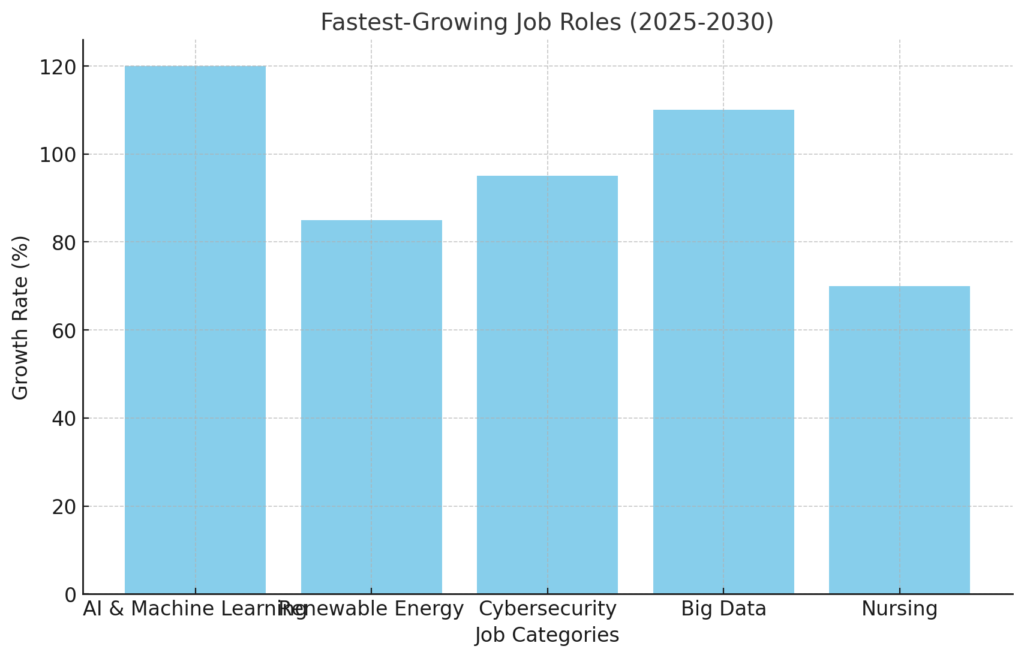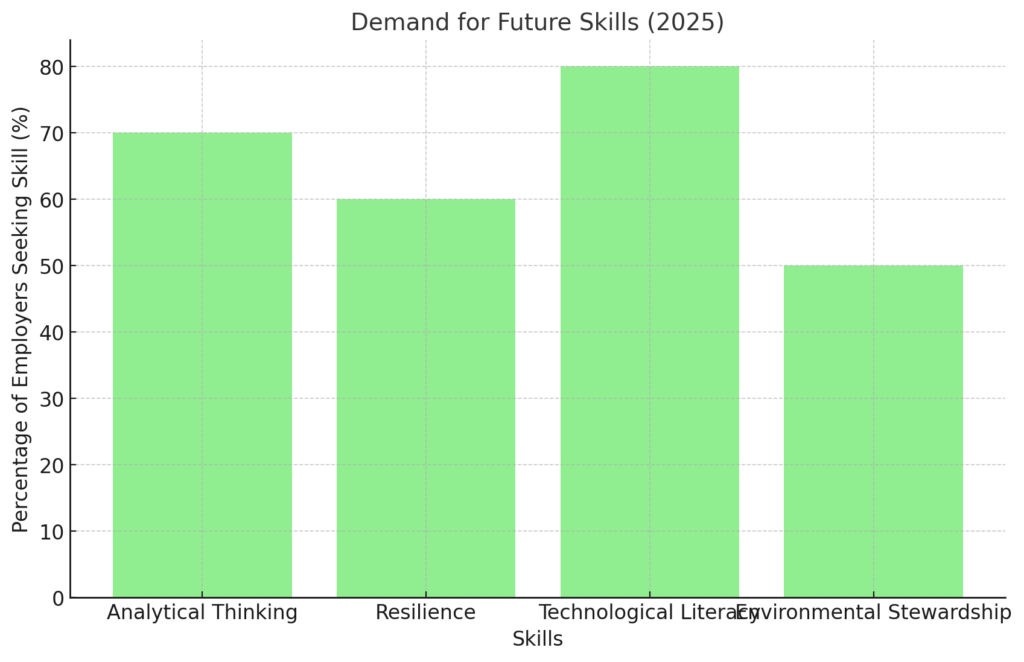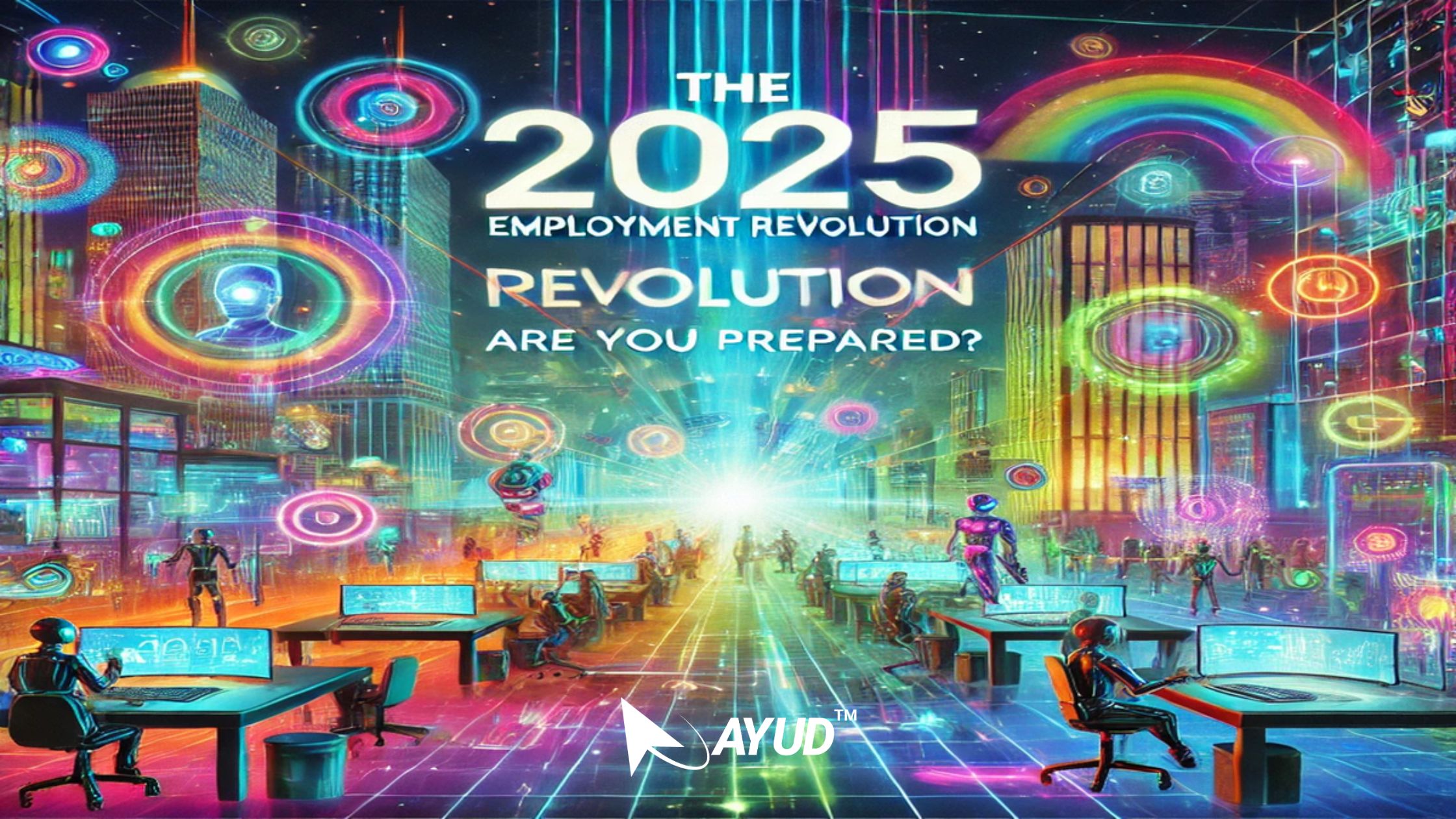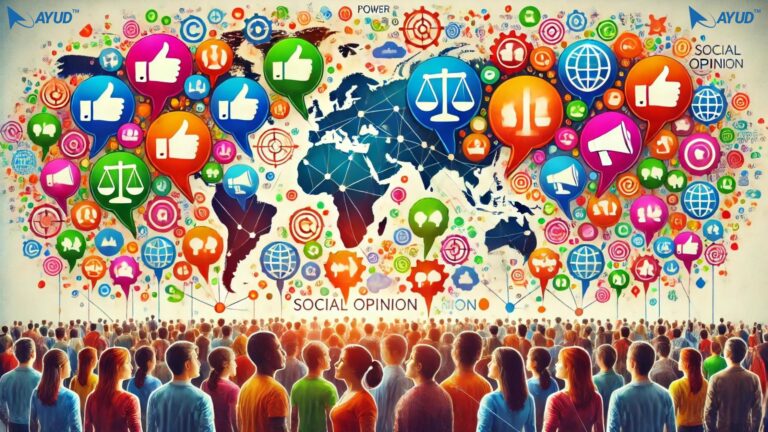The 2025 Employment Revolution: Are You Prepared?
As the world progresses into 2025, the job market stands at the cusp of significant transformation. The convergence of technological innovation, demographic changes, environmental imperatives, and global economic shifts is reshaping industries and the skills required to thrive within them. This blog aims to demystify the findings from the World Economic Forum’s Future of Jobs Report 2025 and offer actionable insights for professionals, students, and organizations to adapt and excel in this evolving landscape.
The Key Drivers of Change
Understanding the forces driving change in the global labor market is essential. Here are the five key macrotrends highlighted in the report:
Technological Advancements
The rise of artificial intelligence (AI), robotics, and digital tools has been transformative. Technologies like generative AI and automation systems are leading to new opportunities while displacing traditional roles.
Example: AI adoption has surged, particularly in sectors like IT and healthcare, enabling efficiency and innovation but also requiring upskilling to remain relevant.
Companies that integrate AI and automation effectively are likely to achieve higher productivity and global competitiveness.
Economic Volatility
Rising costs of living and economic uncertainties continue to impact businesses and workers alike. Companies are optimizing operations to adapt to slower growth rates and fluctuating inflation levels.
Financial resilience is becoming a priority for both employers and employees, influencing wage strategies and job designs.
Green Transition
Environmental concerns are shaping the future of industries. Jobs related to renewable energy, sustainable practices, and climate adaptation are on the rise.
Example: Renewable energy engineers and climate adaptation specialists are among the fastest-growing roles.
Governments and organizations are investing heavily in green technologies, influencing job creation in fields like renewable energy, electric vehicles, and waste management.
Demographic Shifts
Aging populations in high-income countries and expanding working-age groups in low-income nations create contrasting challenges and opportunities.
Companies are focusing on healthcare jobs and educational roles to cater to these demographic trends.
Example: Countries with aging populations, like Japan and Germany, are seeing rapid growth in elder care and healthcare roles, while nations with young populations, such as India, are focusing on education and technology roles.
Geoeconomic Fragmentation
Trade restrictions, geopolitical tensions, and shifting alliances are altering business strategies globally, leading to increased demand for cybersecurity and resilience-focused skills.
Companies in regions with significant trade dependencies, like Southeast Asia, are exploring reshoring and diversification to manage risks.
Fastest-Growing Jobs in 2025
The report predicts that by 2030, 22% of current job roles will be either newly created or displaced. Here are some of the fastest-growing roles:
Big Data Specialists: As data becomes a cornerstone of decision-making, expertise in big data analytics is in high demand.
AI and Machine Learning Specialists: These professionals are pivotal in developing and deploying AI technologies.
Renewable Energy Engineers: With the green transition, roles focused on sustainable energy solutions are rapidly expanding.
Cybersecurity Analysts: As digital threats grow, so does the need for robust cybersecurity measures.
Nursing Professionals: Driven by aging populations, healthcare remains a critical sector for growth.
These roles highlight a blend of technological and human-centered skills, emphasizing the importance of adaptability in an evolving market.
Skills for the Future
Skills are evolving as fast as the job market. The report highlights that 39% of core skills required in 2025 will differ from today. Key skills include:
Analytical Thinking
Employers rank analytical thinking as the most crucial skill. Problem-solving and data interpretation capabilities are paramount.
Analytical thinking is also critical in fields like AI, where understanding complex systems and making data-driven decisions are essential.
Resilience and Agility
Flexibility in adapting to new tools, technologies, and roles will differentiate thriving professionals.
This skill is especially valued in industries experiencing rapid technological and environmental changes.
Technological Literacy
Familiarity with AI, big data, and digital platforms is essential across industries.
Employees with the ability to use digital tools effectively are likely to be more productive and innovative.
Environmental Stewardship
Knowledge of sustainable practices is increasingly valuable.
Roles in sustainability require a deep understanding of environmental regulations, renewable resources, and energy-efficient technologies.
Barriers to Workforce Transformation
Despite the opportunities, challenges remain:
Skill Gaps: 63% of employers cite skill mismatches as a significant barrier to transformation.
Economic Pressures: Rising operational costs deter investments in upskilling and innovation.
Talent Shortages: Recruiting individuals with the right skills is becoming harder, particularly in technology-focused roles.
Resistance to Change: Employees and organizations often resist adapting to new technologies and methodologies.
Strategies for Adaptation
To navigate these changes, individuals and organizations must adopt proactive strategies:
Upskilling and Reskilling
Companies and governments need to prioritize training programs that align with emerging roles.
Example: Many organizations now sponsor AI and sustainability training programs.
Fostering Diversity
Inclusion of diverse talent pools can address skill shortages and enhance innovation.
Organizations with inclusive policies report better employee retention and satisfaction rates.
Investing in Employee Well-being
Supporting mental health and providing flexible work environments improve talent retention.
Work-life balance initiatives are becoming a key factor in attracting top talent.
Leveraging Technology
Embracing tools like AI for collaboration and efficiency is crucial.
Using automation to handle repetitive tasks allows employees to focus on higher-value work.
Real-World Example: The Journey of Emily, a Teacher Turned Data Analyst
Emily, a high school teacher, found her role becoming increasingly challenging due to technological advancements in education. Recognizing the shift, she enrolled in an online data analytics program. Today, Emily works as a data analyst at a renewable energy firm, using her newfound skills to predict energy consumption trends. Her story exemplifies the importance of adaptability and lifelong learning.
Visual Insights
Feature Image Suggestion: A futuristic office environment showcasing AI integration, diverse teams, and green energy solutions.
Job Growth vs. Job Loss by Sector
Display industries with the highest growth (e.g., technology, healthcare) and decline (e.g., clerical roles).
Skill Demand Projections
Highlight the fastest-growing skills like AI, data analytics, and resilience.
Automation vs. Human Tasks by 2030
Show the shifting balance of task allocation between humans and machines.
Fastest-Growing Job Roles (2025-2030): Highlights categories like AI, renewable energy, and cybersecurity with significant growth percentages.

Demand for Future Skills (2025): Showcases the percentage of employers seeking skills like analytical thinking and technological literacy.

Job Growth vs. Loss by Sector (2025-2030): Depicts the contrast in job growth in technology and healthcare against losses in retail and clerical roles.

Conclusion
The 2025 labor market is both a challenge and an opportunity. While macrotrends disrupt traditional roles, they also create pathways for innovation and growth. By embracing change, focusing on lifelong learning, and prioritizing resilience, individuals and organizations can thrive in this dynamic era. Let Emily’s story inspire you to adapt and lead in the future of work.
With foresight and preparation, we can navigate these shifts effectively, turning challenges into stepping stones for a brighter, more inclusive future of work.
#FutureOfJobs #Workforce2025 #SkillDevelopment #GreenJobs #AITransformation #UpskillingJourney #ResilienceAtWork #ayud #ayudjobs #askayud #MultiLanguageSupport #ResumeBuilder #gotestit #ayudian #ayudblog #ayudcareer #EdTech #EducationTechnology #DigitalLearning #OnlineEducation #FutureOfEducation #TechInEducation #SmartLearning #EdTechSolutions #LearningInnovation #21stCenturySkills
How to Use Ayud : A Comprehensive Guide
Join our what’s app channel for timely updates
Click here to install Ayud Jobs App from Playstore







